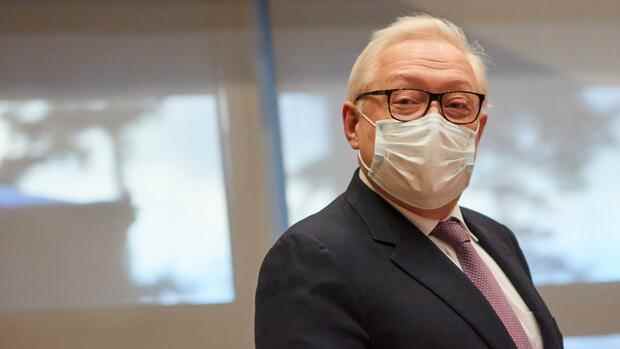After many warnings, representatives of the USA and Russia are now negotiating in Geneva.
(Photo: AP)
Uncompromising, sharp verbal attacks and ever new accusations: Relations between Russia and the West have reached a new low. The political temperature is as frosty as it was when the Soviet Union deployed SS20 mobile nuclear missiles and NATO announced retrofitting with its famous double decision. As in the early 1980s, Russia and the USA are again negotiating security in Europe in Geneva. Because again there is a political ice age.
Unlike then, there are intensive trade relations with Russia today – even if they have suffered greatly since the Russian annexation of the Ukrainian Black Sea peninsula of Crimea in 2014. If there were now a spiral of sanctions as a result of a Russian invasion of Ukraine, these economic relations would quickly shrink to the level of the Cold War era.
That would be a severe blow, especially for German industry. It’s not just about the Nord Stream 2 Baltic Sea pipeline, which has already been rejected by European and American allies. Russia has also become a popular production location and sales market for many German companies. The huge empire in the east is Germany’s number 14 trading partner.
In order to preserve peace, but also because of economic interests, German foreign policy must have an overarching goal: the war of words must not turn into a hot war.
Top jobs of the day
Find the best jobs now and
be notified by email.
In order to prevent such a situation, it would be best for Federal Chancellor Olaf Scholz to follow in the footsteps of his compatriot Helmut Schmidt from Hamburg. He jeopardized his political offices by sticking to NATO’s double resolution. When he was no longer Chancellor and the reformer Mikhail Gorbachev took his seat in the Kremlin, a compromise was reached: disarming SS20 and Pershing II missiles. Far-reaching arms control agreements followed.
Negotiations have poor prospects
These have either expired in recent years or were deliberately terminated by Washington or Moscow. This, too, is one reason why we are currently experiencing another political ice age – and why the current negotiations have so little prospect of success.
Today’s deterrents are no longer rockets and cruise missiles, but resounding economic sanctions. As in the case of NATO’s double decision, this requires determination and a willingness to make sacrifices. The federal government in particular has to tailor these measures precisely with the other EU countries. Unity in the West is the greatest deterrent and Russia is economically vulnerable.
The rejection of sanctions by the potentially affected companies is understandable. But keeping the peace is worth such sacrifices – also with a view to the long-term economic prospects.
And in the spirit of Helmut Schmidt this means: With the clear stance that, if the worst comes to the worst, we must also take the toughest sanctions, we must now negotiate very seriously about a viable security architecture for Europe and about arms control agreements. Instead of rockets and speeches, today’s double decision means: negotiations – and sanctions, should they fail.
More: Negotiating with the Russian aggressor: what does Putin want?
